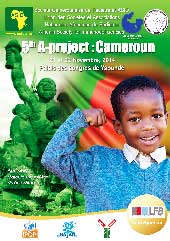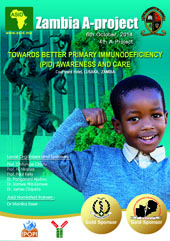ASID Welcome Address
Dear Colleagues and Friends,
I welcome each and every one of you to the 9th Biennial Congress of the African Society for Immunodeficiencies (ASID 2025). This year, we are delighted to host the congress jointly with the Allergy Society of Kenya (ASOK), in Nairobi, from June 25-27, 2025.
ASID has been on an incredible journey over the years, steadily growing our network across Africa, to promote the diagnosis and care of individuals living with primary immunodeficiencies. We constantly strive for the very best practices, while remaining aware of the unique and often complex challenges that define our African context. This is reflected in the theme of this year’s congress: ‘The African Landscape of Primary Immunodeficiencies and Allergies – in the Era of Personalized Medicine’. It’s a theme that speaks directly to the future we envision for every patient on our continent.
We are privileged to feature a distinguished lineup of speakers, whose collective expertise and commitment to improving patient care will inspire new ideas and forge invaluable collaborations in the region.
On behalf of ASID, I extend my heartfelt gratitude to ASOK for their fantastic partnership in making this congress a reality. To all our esteemed speakers, thank you for generously sharing your knowledge. To our valued sponsors, your unwavering support is the foundation upon which we build such important meetings. A special note of appreciation to IPOPI and INGID, who have thoughtfully organized their African Patients’ Meeting, and Nursing Education Day, respectively, to run in parallel to the congress, to create an enriching experience for all. I extend my sincere thanks to the scientific and organizing committees for their tireless efforts in bringing this congress to fruition. Finally, to you, our delegates, thank you for joining us on this journey.
I encourage you to actively participate in the workshops and engage in the sessions, connect with your peers and seize every opportunity to learn and network.
Welcome to ASID 2025 and enjoy the congress.

Karibuni Kenya!
Dr. Anne BARASA
ASID President 2023 – 2025
Dear Colleagues and Friends,
Since its creation in 2008 in Morocco, the African Society for Immunodeficiencies (ASID) never failed to thrive to reach its objectives: sharing experiences and raising medical and public awareness with regard to the basic and clinical science of PIDs in Africa.
Throughout the years, we conducted several educational activities (ASID schools, A-projects, Biennial meetings) and expanded the African network in several regions. The pandemics did not slow us down, and we found a new way to promote evidence-based management and care of individuals suffering from PID, throughout webinars and hybrid meetings.
We’re thankful to get your requests regarding ASID School or organizing an A-Project in your country, so never hesitate to reach out to us. We’ll do our best to complete as many successful projects as needed, to improve care for patients suffering from PID/IEI.
Regarding other projects, we’re thriving to establish the ASID registry and to publish some African clinical guidelines. Indeed, access to diagnostic tools is often limited in African countries, and clinical features are impacted by our environment, so we felt the need to develop specific clinical guidelines for this continent. However, all our efforts would be void if clinicians in contact with PID patients don’t reach out to us to register their patients. Please contact our Registry committee (Monika Esser, Ali Sobh) to participate to the registry. A good picture of PID distribution in Africa is important to focus our efforts on the main issues faced by our patients.
Sustaining our activities and our website is a constant challenge for our Society, and we’re thankful to our sponsors for their continuous support. However, membership fees are getting unavoidable and the 2019 General Assembly agreed to its necessity. Technical issues prevented us to set up these fees in 2019-2021 mandates. We’re currently testing some ways to overcome and will hopefully find a satisfying solution soon.
We’re currently in preparation for the ASID 2023 meeting. To avoid clashing with our sister societies meetings, we moved back the meeting to June 14-17, in Casablanca. Registrations are open on the congress website: https://www.congress.asid-africa.org/
Finally, I’d like to thank the ASID Board for their continuous support and involvement. Thanks to them, we advanced further on the road to success.
To all ASID members and friends, keep in touch with us and stay safe.
Best regards,
Dr Leïla JEDDANE, PhD
ASID President 2021-2023
Website 8th ASID Congress : https://www.congress.asid-africa.org
Since 2013, the International Union of Immunological Societies (IUIS) expert committee (EC) on Inborn Errors of Immunity (IEI) has published an updated phenotypic classification of IEI, which accompanies and complements their genotypic classification into ten tables. This phenotypic classification is user-friendly and serves as a resource for clinicians at the bedside. There are now 430 single-gene IEI underlying phenotypes as diverse as infection, malignancy, allergy, autoimmunity, and autoinflammation. We herein report the 2019 phenotypic classification, including the 65 new conditions. The diagnostic algorithms are based on clinical and laboratory phenotypes for each of the ten broad categories of IEI.
Link : https://www.ncbi.nlm.nih.gov/pmc/articles/PMC7082388/
President address:
Dear Friends and Colleagues,
Warm greetings.
I hope you and your loved ones are keeping well during these unprecedented times of the SARS-Cov2 pandemic. The whole world is suffering and Africa is not different with the exception of a delay in the pandemic wave and the apparent fewer numbers of patients which might be a result of limited resources of diagnosis and/or distraction with other persisting health or economic priorities in different regions...
Legacy
On Wednesday the 4th of March 2020, we received the sad news of losing Prof Chipeta who passed away on Monday 2nd of March 2020. It was a shock to me and my colleagues within the ASID Board as we did not know about his illness. James was very active till his last days supporting the Kenyan team with improving PID awareness. He was one of the first African doctors keen on PID development in Africa and was ASID President 2015-2017. He had his own vision on PID development in Africa and was one of the most active A-project trainers.
James is a huge loss, not only to his patients and local community but to the African PID community. May God rest his soul in peace and grant his family, patients and loved ones the patience and acceptance of his sad loss.
On behalf of ASID and ASID board, I would like to pay special tribute to him and send his family our deep condolences.
Dr Nahla Hashim Hassan Erwa
ASID President 2019-2021
Sectors:
I. In the era of COVID-19
- Updated joint COVID statement published on IPOPI website:
IPOPI publishes the 3rd update to the Joint Statement on COVID-19 - IPOPI
- Risk stratification for patients with PID at risk for severe disease if encountered COVID-19- adapted from the UK PIN
There is no clear evidence that children with Primary Immunodeficiency (PID) are at great risk of developing COVID-19 or are at greater risk of severe complications from this infection. Data are still limited regarding the extent of the disease in patients with PID and if patients with PID are chronic shedders of the virus. However, based on expert immunologist opinion (Link) , patients with Primary Immune deficiency are divided into 3 groups based on potential risk for COVID-19. Dr. Reem Elfeky- Immunology consultant at Royal Free Hospital, the UK has created an easy-to-ready flowchart adapted from the UK PIN risk stratification.
II. Educational Section
- ASID participation in the International Alliance forPrimary Immunodeficiency Societies school (IAPIDS): Lisbon- From 30th of January to 2nd February 2020
We are very pleased that ASID organisation has actively participated in the delivery of 1st IAPIDS Advanced PID School 2020; jointly organised by the International Alliance for Primary Immunodeficiency Societies (APSID, ASID, CIS, ESID and LASID). This event was an excellent opportunity to advance participants' knowledge around primary immune deficiencies from diagnosis to management. Encouraging comments from faculty members and participants reflect the success of the school. (Link).
- Potential for gene therapy in Africa- IPIC 2019
Prof. Aziz Bousfiha – Professor in paediatric immunology/infectious disease- Hassan II University, Casablanca, Morocco; presented results of a conducted survey among African centres regarding feasibility for gene therapy in Africa – IPIC 2019 (Link).
- STAT1 deficiency - a case report
Dr Zainab M Golwala. Co-authors: Prasad Taur, Shraddha Chandak, Purva Kanvinde, Aparna Dalvi, Jacinta Bustamante, Manisha Madkaikar, Mukesh Desai. Department of Immunology, B.J. Wadia Hospital for Children, Mumbai, NIIH, ICMR, Mumbai. (Link)
- XLP1 and XLP2- from diagnosis to treatment- power point presentation
Dr. Ali Sobh- Lecturer of paediatric immunology in Al Mansoura University, Egypt is presenting an educational power point presentation on patients with XLP1 and XLP2 from diagnosis to treatment (Link).
III. Advocacy for patients with primary immune deficiency
- Hereditary Angioedema: A Message from the Sub Saharan HAE Patient Representative to African Patients and Practitioners.
By: Patricia Karani, HAEi Sub Saharan Representative, Nairobi, Kenya ()
Hereditary Angioedema (HAE) is a rare and disabling condition that runs in families and affects 1 in 10,000 to 50,000 individuals with a mortality rate of about 30%. HAE is a chronic inherited life-threatening condition that mostly manifests in massive swellings occurring spontaneously both externally on the muscle and subcutaneous tissues, and internally in the abdomen and throat. It may initially appear like an allergic or chronic spontaneous angioedema however with further investigations it is identified NOT TO BEmast cell or histamine- mediated allergic reaction and it DOES NOT respond to antihistamines, corticosteroids or epinephrine.
Early diagnosis of this condition saves lives. This depends on identifying the symptoms and signs and doing the correct laboratory investigations. HAE is a bradykinin mediated condition that stems from deficient and dysfunctional C1- inhibitor of the complement system. Peripheral swelling attacks appear on the face, lips, eyes, hands, feet and genitalia. These DO NOT present with urticaria or itching. The condition may also manifest in laryngeal swellings that could be life threatening. Abdominal swellings are especially very painful and debilitating and are accompanied by nausea and diarrhea. These may present as an acute abdomen which may lead to surgical intervention imposing even more hazards to the patient’s life.
According to World Allergy Organization the first line of management should be preventative medication.
Recommended prophylactic medications include androgens such as danazol and antifibrinolytics like tranexamic acid. These however are not recommended for on demand or emergency treatment as the drugs show no or only minimal effects when used after onset of swellings.
During the management of an attack C1-INH concentrate should be administered at the onset of the attack to experience a better and quicker resolution of the swelling.
Recommended effective emergency medications include C1 -INH concentrate and recombinant C1-INH as well as other therapies such as icatibant and ecallantide amongst others. In some cases where the modern medication is not available, solvent detergent treated plasma (SDP) or fresh frozen plasma (FFP) can be administered. It is also important to note that some of these medications are not recommended for pregnant/ lactating women as well as children.
Very few patients have been recorded in Africa in general and sub-Saharan Africa in particular. Knowing the clinical presentation of the disease is necessary as is the availability of laboratory diagnosis and treatment options. More awareness is required about the condition and better collaboration between practitioners, scientific and patient organizations is also needed to improve awareness and facilities.
HAEi is a non-profit organisation that brings together patients living with hereditary angioedema, as well as networking with physicians and caregivers with an aim to raise more awareness about the condition and thereby reduce the long lapse to diagnosis and ensure that patients have access to better management and effective treatments that reduce the debilitating effects of this rare yet life-threatening condition and consequently assist a patient realizes a more normal and productive life. HAEidelivers patient-membership organisations in more than 90 different countries globally and is hoping to reach as many patients as possible around the world.
Source:
The International WAO/ EAACI guideline for the management of hereditary angioedema -the 2017 revision and update.
- IPOPI -ASID advocacy and guidance statement on IVIG
“Improving the lives of patients with Primary Immunodeficiencies in Africa by providing sustained access to safe immunoglobulin replacement therapies: collaborative efforts of IPOPI and ASID”
(Link)
March 24, 2020, New York.
Dear friends,
A number of inborn errors of immunity (IEIs) selectively underlie life-threatening viral diseases, including herpes simplex virus encephalitis, fulminant viral hepatitis, lethal cytomegalovirus primary infection, severe influenza pneumonitis, and others.
توصيات للوقاية من فيروس كورونا، لمرضى ضعف المناعة الأولي ضمأ 11 مارس 2020 : من الفدرالية الدولية لجمعيات ضعف المناعة الأولي IPOPI مصادق عليها من طرف الجمعيات العلمية القارية و الجهوية لضعف المناعة.
تحميل النسخة العربية من ترجمة الجمعية المغربية للتواصل الصحي.
Joint statement on the current epidemics of new Coronavirus SARS-CoV-2— COVID-19 From IPOPI, ESID, INGID, APSID, ARAPID, ASID, LASID, SEAPID (Original statement, as of 2020, 13th February, 1st update, as of 2020, 10th March).





































